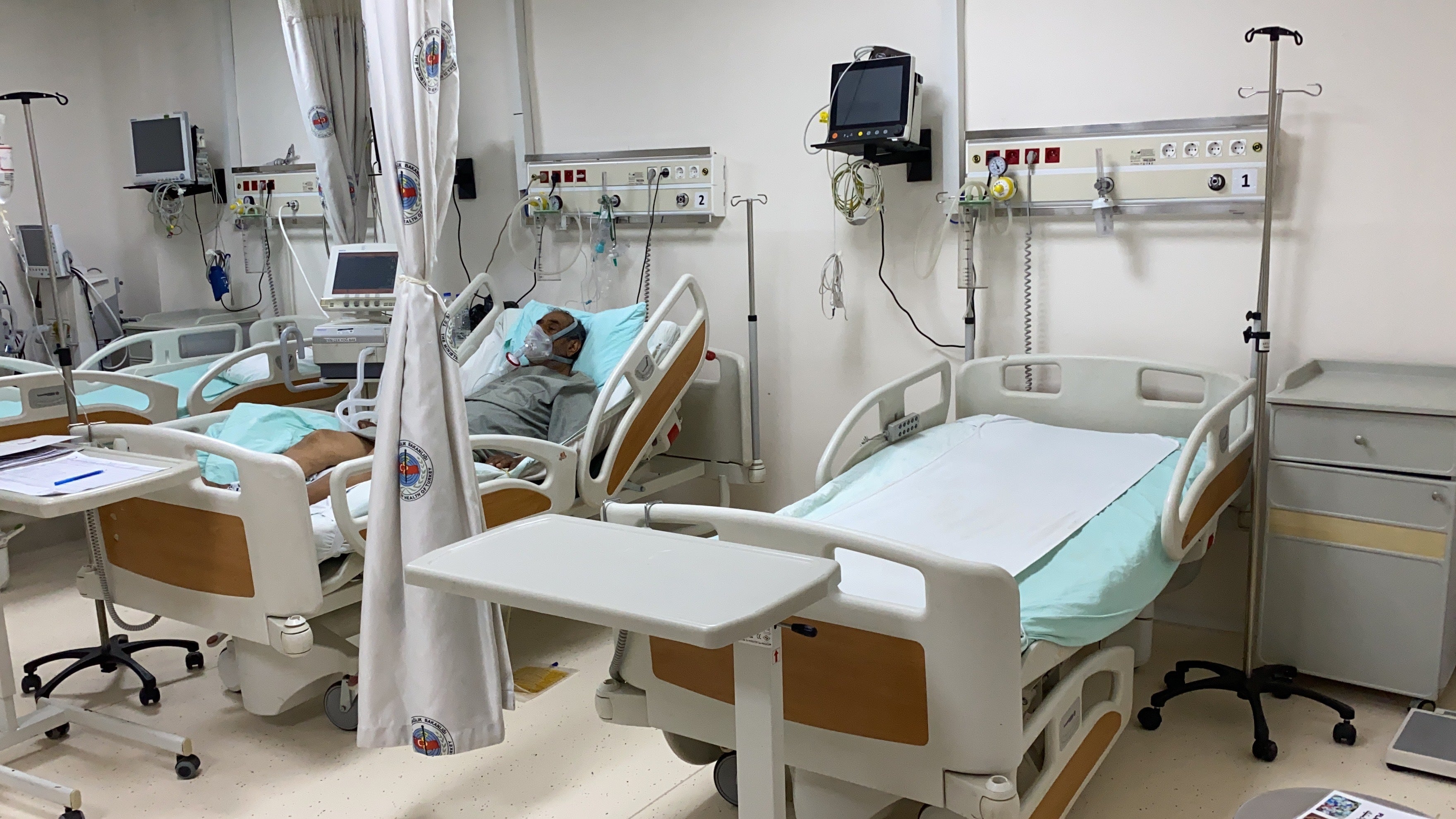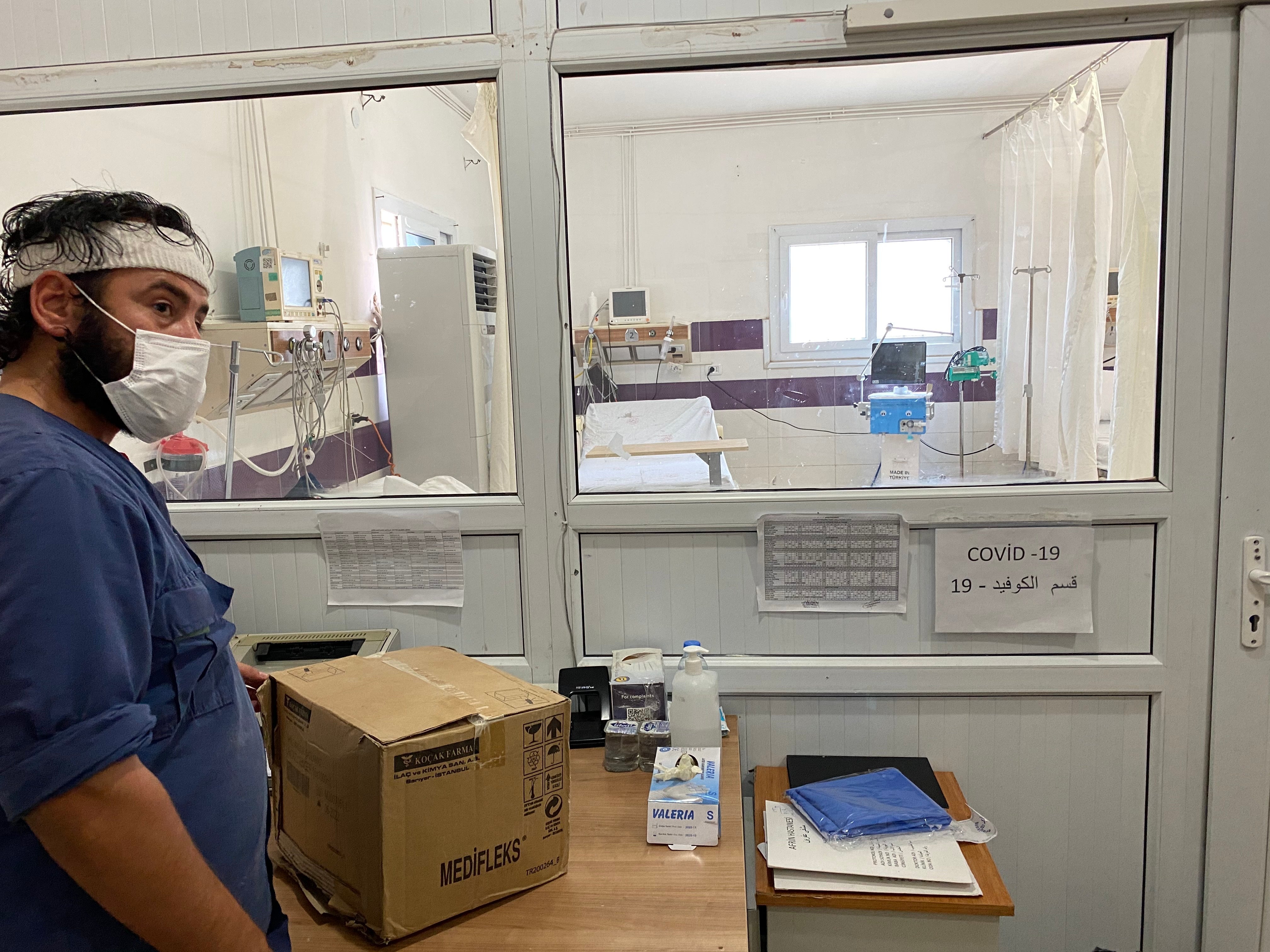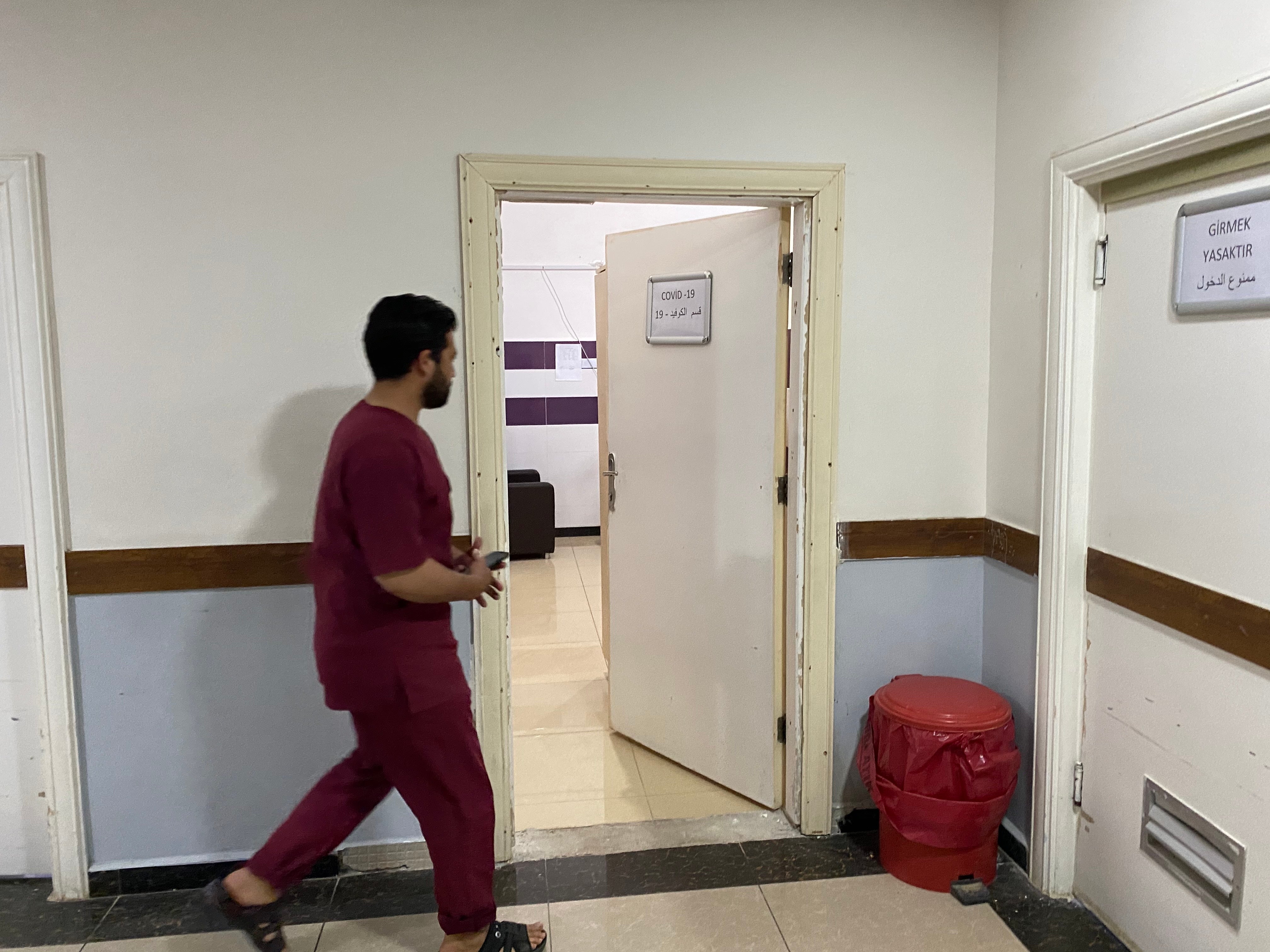‘You feel the pain’: Amid war and geopolitical posturing, Syrian physicians struggle to contain Covid
During a trip to Afrin and Tal Abyad, Borzou Daragahi made rare visits to hospitals fighting the pandemic


A father and son arrived at the hospital, both ill and showing symptoms of Covid-19. Medics brought the elderly father, who was in his seventies, into the intensive care unit at the main hospital in the northwestern Syrian city of Afrin, and put him on oxygen and life support.
Hours later the son also took a turn for the worse, and he was put on oxygen, as well, the two men lying side by side in the isolation ward.
Quick action helped. The father survived. But his son succumbed to the disease, among the tragedies of a pandemic that has not spared war-ravaged corners of the world already stricken with death and despair.
“Of course you feel the pain,” says Mazen Al-Amari, the physician overseeing the Covid ward at Afrin hospital, among the medical facilities handling coronavirus cases in northern Syria.
“One year ago, we didn’t have the experience with Covid that we do now,” he says. “We had fear. It was horrifying to try to deal with these cases when we did not understand how it’s spreading.”
With Zoom learning and the benefit of shared wisdom with doctors in the west and in neighbouring Turkey, physicians in Syria have managed to grapple with several waves of Covid-19.
But during two rare recent visits arranged by Turkish authorities to Covid wards in two separate northern Syrian cities, physicians and aid workers cited a lack of equipment and a lack of public awareness as potentially hampering efforts to fight the pandemic.
More trouble looms. The United Nations Security Council is preparing to vote on measures in the coming days to allow international aid across Syria’s northern borders into parts of the country outside the control of the central government in Damascus.
Hundreds of trucks transport food, medicine and other items through Turkey to northern Syria, but the UN resolution authorising these operations is set to expire on 10 July.
We literally feel like we’re fighting a pandemic with paracetamol
Russia opposes allowing the aid because it undermines the authority of its client, the dictatorial Syrian ruler Bashar al-Assad. But experts warn preventing the UN from directly accessing opposition-held stretches of Syria will have dire consequences.
“We call for the renewal of Security Council authorisation for cross-border operations from Turkey to northwest Syria,” said a statement issued last week by UN aid officials. “A failure to do so would immediately stop UN delivery of food, Covid-19 vaccines, critical medical supplies, shelter, protection, clean water and sanitation, and other life-saving assistance to 3.4 million people, including 1 million children.”
Preventing UN officials from directly accessing northern Syria increases the cost and delivery times of supplies, as well as putting truckers and aid workers in peril.
“The smallest common denominator is lack of supplies – personal protective equipment, oxygen, and medical supplies,” said Suad Jarbawi, of the aid group International Rescue Committee, during a recent briefing with international journalists.
“The most important thing is that people trust the vaccine,” she said. “In northeast Syria, the fact that there is no clarity about the vaccine campaign and who will deliver it, and that is raising the anxiety and the conspiracy theories.”

Miraculously, the coronavirus situation seems almost under control for now.
Northern Syria’s relative isolation from the rest of the world may have helped efforts to fight Covid. Borders are all but closed. Movement between enclaves controlled by warring factions remains difficult. Amari, in Afrin, said the latest wave has subsided, giving physicians and aid workers time to prepare for the next variant or infection surge. Statistics gathered by Johns Hopkins University showed infection numbers have declined nationwide since an all-time high in April.
“We have set up a special department for Covid cases, but we really need oxygen,” he says.
At a Turkish-supported hospital in Tal Abyad, a sole patient suspected of having Covid lay writhing on a bed in the isolation ward, struggling to breathe. The most complicated and dire cases are sent across the border to hospitals in Turkey.
Ibrahim Hussein, a physician who relocated to the town from Deir Azzour, said 70 per cent of those ultimately tested turn out to be positive, and warned that people were ignoring basic preventative measures such as hygiene and distancing.
On the streets and in the markets, few were wearing protective masks. During a visit to Afrin’s pedestrian-only Souq Shaabi marketplace, not a single customer or shopkeeper was wearing a mask or appeared to be abiding by social distancing measures. Bajhat Battal, a 74-year-old pharmacist in Afrin, said patients often come to his shop first when they get sick, and he offers them paracetamol and vitamin C.
“As you can see no one wears a mask, so I don’t wear a mask,” he says.
Hussein, the physician in Tal Abyad, warned of large numbers of cases that go unrecorded in isolated villages far from hospitals.
“We are facing too many cases because of the lack of awareness,” he said. “They don’t do any kind of measures against coronavirus.”
A vaccination campaign has just got under way, with physicians, nurses and medical personnel among the first to receive jabs. Hesitancy is high. Anti-vaccination propaganda pours in through social media.
“The UN sends the vaccines, but many people are refusing to vaccinate,” says Amari, the physician in Afrin. “Even for those people who are in danger because of other conditions, they are afraid because of the news that they hear.”
The pandemic has also hit regime-held parts of Syria hard.

Officially, over 25,000 people have tested positive for the virus and more than 1,800 have died of it, but most experts say the numbers are far higher. The country’s healthcare infrastructure has been ravaged by a 10-year war, ignited by the Assad regime’s attempts to violently suppress an opposition protest movement. Forces loyal to Assad have regularly bombed Syrian hospitals and clinics.
The United States has said it would relax sanctions that could hamper the delivery of medical aid pertaining to the pandemic, and Russia has promised to provide Assad with vaccines, while the UN is free to work in those parts of the country under the grip of Assad and his deputies.
Aid officials fear areas under the control of former rebels or autonomy-minded Kurdish-led forces are being starved of resources. Health officials in the country’s northeast warned this week of a sudden spike in new cases, including at the al-Hol camp where the families of former Isis fighters are being held.
“Until now we’re not able to know with certainty the Covid rate in Syria,” said Jarbawi. “We literally feel like we’re fighting a pandemic with paracetamol. Are people at risk? Absolutely they are at risk.”
Join our commenting forum
Join thought-provoking conversations, follow other Independent readers and see their replies
Comments